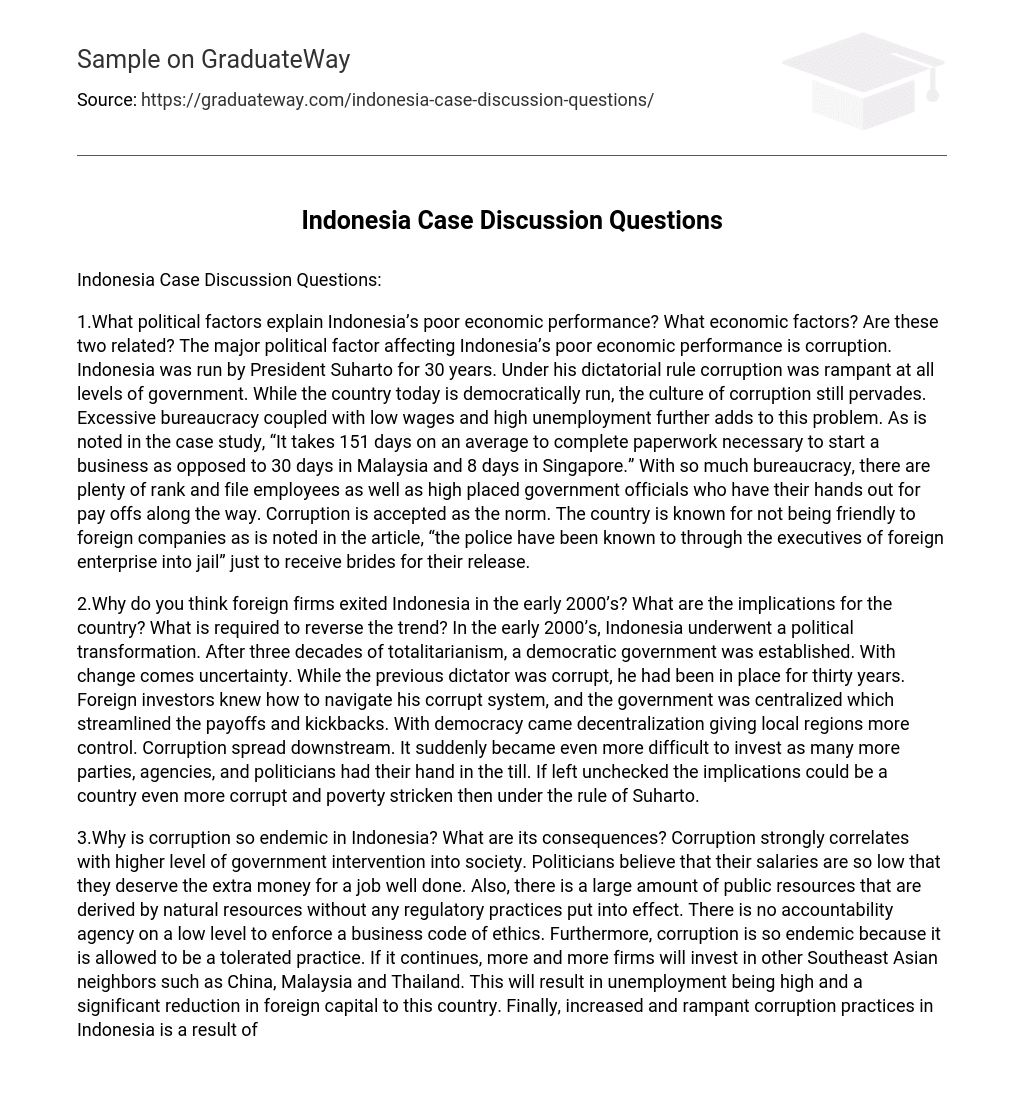What political factors explain Indonesia’s poor economic performance? What economic factors? Are these two related?
The major political factor affecting Indonesia’s poor economic performance is corruption. Indonesia was run by President Suharto for 30 years. Under his dictatorial rule corruption was rampant at all levels of government. While the country today is democratically run, the culture of corruption still pervades.
Excessive bureaucracy coupled with low wages and high unemployment further adds to this problem. As is noted in the case study, “It takes 151 days on an average to complete paperwork necessary to start a business as opposed to 30 days in Malaysia and 8 days in Singapore.” With so much bureaucracy, there are plenty of rank and file employees as well as high placed government officials who have their hands out for pay offs along the way.
Corruption is accepted as the norm. The country is known for not being friendly to foreign companies as is noted in the article, “the police have been known to through the executives of foreign enterprise into jail” just to receive brides for their release.
Why do you think foreign firms exited Indonesia in the early 2000’s? What are the implications for the country? What is required to reverse the trend?
In the early 2000’s, Indonesia underwent a political transformation. After three decades of totalitarianism, a democratic government was established. With change comes uncertainty. While the previous dictator was corrupt, he had been in place for thirty years. Foreign investors knew how to navigate his corrupt system, and the government was centralized which streamlined the payoffs and kickbacks. With democracy came decentralization giving local regions more control.
Corruption spread downstream. It suddenly became even more difficult to invest as many more parties, agencies, and politicians had their hand in the till. If left unchecked the implications could be a country even more corrupt and poverty stricken then under the rule of Suharto.
Why is corruption so endemic in Indonesia? What are its consequences?
Corruption strongly correlates with higher level of government intervention into society. Politicians believe that their salaries are so low that they deserve the extra money for a job well done. Also, there is a large amount of public resources that are derived by natural resources without any regulatory practices put into effect. There is no accountability agency on a low level to enforce a business code of ethics. Furthermore, corruption is so endemic because it is allowed to be a tolerated practice. If it continues, more and more firms will invest in other Southeast Asian neighbors such as China, Malaysia and Thailand.
This will result in unemployment being high and a significant reduction in foreign capital to this country. Finally, increased and rampant corruption practices in Indonesia is a result of very low salaries of the government bureaucrats, and they inevitably demand bribes from any company that needs government approvals for setting up and continuing business. Excessive “red tape” by the government officials (5 to 20 times the number of the days compared to Malaysia and Singapore respectively) for completion of paperwork to start business in Indonesia creates a chain of officials at every level looking for bribes.
What are the risk factors facing foreign firms that do business in Indonesia? What is required to reduce those risks?
There are multiple risk factors for companies doing business in Indonesia. One risk is the image these firms will have in working with a country that is considered to be one of the most corrupt. Another risk factor is the unfair costly business practices that has prevailed. In addition, the risk factors faced by foreign firms are prolonged wait times with excessive red tape in setting up businesses associated with demand for high bribes. This may add to the cost or cut on their revenues generated. Also, unnecessary and intentional jail time for trivial issues resulting from foreign firms, leading to further corruption is another risk faced by foreign business firms.





